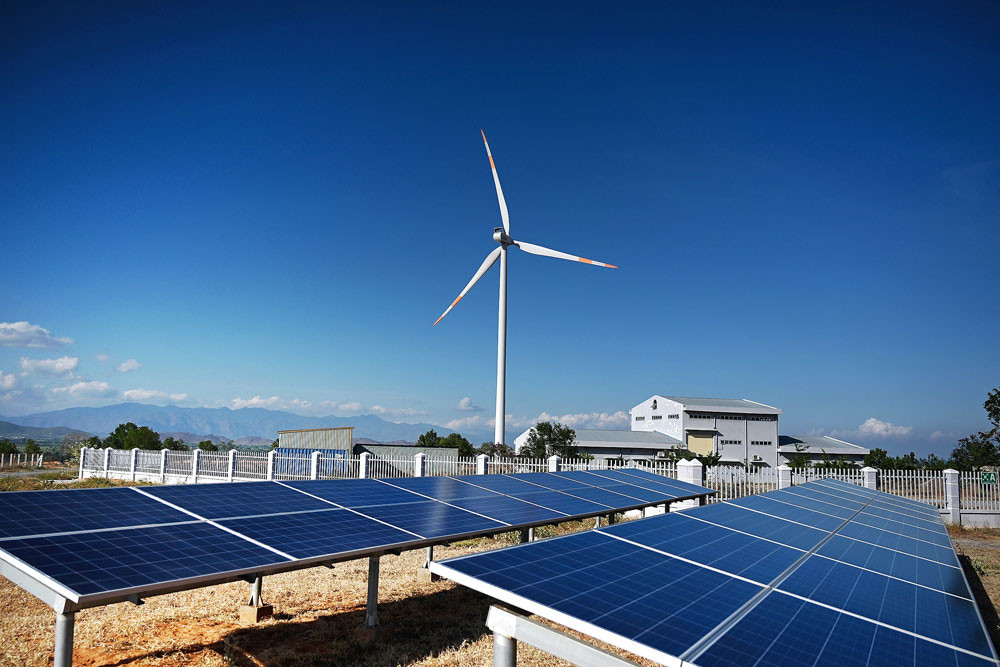Stakeholders clash over nuclear in green energy bill
Nuclear energy, liquefied coal and coal gas – the latter product being pioneered by state-owned coal miner PT Bukit Asam – are all categorized as “new” but not “renewable” in the draft bill, a copy of which was obtained by The Jakarta Post.
Change Size

G
reen energy businesses and watchdogs are up in arms over the House of Representatives’ decision to add nuclear and “new” fossil fuel technologies into a landmark green energy bill.
Industry players have issued statements and held public hearings with lawmakers over the past two weeks to protest such an addition in the long-awaited New and Renewables Energy (EBT) bill, which promises legal certainty and incentives for listed industries.
Nuclear energy, liquefied coal and coal gas – the latter product being pioneered by state-owned coal miner PT Bukit Asam – are all categorized as “new” but not “renewable” in the draft bill, a copy of which was obtained by The Jakarta Post.
“Focus this bill on renewables,” said Halim Kalla, deputy chairman for renewables with the Chamber of Commerce and Industry (Kadin), at a hearing in Jakarta on Monday with the House Commission VII overseeing energy.
Read also: This company wants to build Indonesia’s first commercial nuclear power plant
“Add the new energy to their respective laws [not in the bill],” Surya Darma, chairman of the Indonesian Renewable Energy Society (METI), said to lawmakers on Sept 17. “The type of energy that really does not have its own law is renewables.”
METI, an umbrella organization for all local renewable energy associations, referred to the 2001 Oil and Gas law, 1997 Nuclear Energy Law and 2020 Mining Law, which covers coal.
Kadin, METI and a slew of energy watchdogs expect the bill — deliberations on which began in 2017 — to focus on spurring renewable energy use in Indonesia, a country lagging well behind its green energy commitments.
Regulations stipulate that Indonesia should have reached a 17.5 percent renewable energy mix by 2019, yet the country only hit 12.36 percent that year.
“This bill has been held back for three years,” analyst Jannata Giwangkara of the Institute for Essential Services Reform (IESR) said on Wednesday. “It will not immediately solve the issue but it needs to be supported by derivative regulations.”
WWF Indonesia climate and energy manager Indra Sari Wardhani added: “The renewables industry is still very nascent. Don’t give it more challenges and competition.”
Read also: Coal miner Bukit Asam to invest Rp 4t this year, mostly on infrastructure
The business and watchdogs’ pleas responded to the fact that nuclear power plants and new energy technologies have made their way into the draft bill under Article 6 and Article 7, according to the copy.
The latter article outlines the role of the government, private sector, state-owned enterprises (SOE) and a “regulatory agency” in developing nuclear and new energy facilities.
“We, at the Commission VII, also support the downstreaming of coal to create a cleaner fuel,” said commission head Sugeng Suparwoto at Monday’s hearing.
The NasDem politician was referring to the government’s ambitious plans to downstream Indonesia’s mining industry, a plan that includes domestically exploiting more of the country’s abundant coal reserves. The House passed the Mining Law to that effect.
Nuclear and new energy found more support through the Indonesian Electrical Society (MKI) that urged lawmakers to expand the scope of such technologies within the bill.
MKI chairman Wiluyo Kusdwiharto suggested modifying Article 7 into “nuclear is to be used to develop nuclear power plants for peaceful and civilian purposes”, whereby the last clause is meant to address possible nuclear weaponization concerns.
Read also: Jokowi reaffirms Indonesia’s 'massive downstreaming’ of natural resources
MKI, an organization dominated by state-owned electricity company PLN and its subsidiaries, also suggested that the government manage nuclear waste disposal.
Nuclear energy holds a particularly divisive position in the world’s energy transition as some countries, such as Germany and France, plan to scale down while others, such as China and India, plan to scale up.
Indonesia’s legal stance, as written in a 2014 Presidential Regulation (PP), is that nuclear is “the last resort” to electrify the country, a stance reiterated by Energy Minister Arifin Tasrif in January.
Indonesia has three small nuclear power plants for research but no commercial-scale plant, the construction of which is an endeavor being pursued by United States-based Thorcon.









